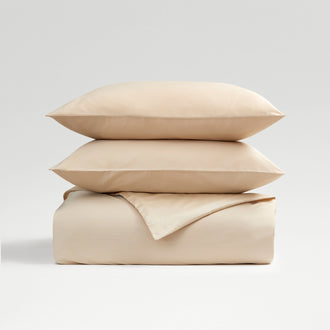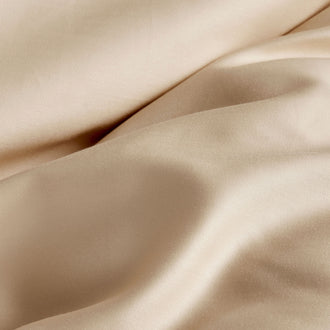lifestyle
How Often Should You Wash Your Bedding According to Experts?
Changing your sheets regularly is essential to create a healthy sleep environment - but exactly how often should you wash your bedding?
In this guide, the experts at Christy reveal everything you need to know about when to wash your sheets. We'll share recommendations from sleep experts and consider the different personal factors that may impact how frequently you change your bedding.
Browse Christy's range of bedding for sumptuous sheets that wash beautifully time and time again.

How often should you change your sheets?
Sleep experts recommend changing your sheets every one to two weeks to maintain cleanliness and a healthy sleep environment. This includes your bottom sheet, duvet cover, and pillowcases, as well as any other sheets that come into direct contact with your skin when you're in bed.
Sheets that go too long without being washed can accumulate dirt, dead skin cells, dust mites, and even mould. This can lead to a wide range of health issues including allergies and asthma, as well as skin infections and acne. Washing your sheets at least every fortnight will help to eliminate allergens and germs, contributing to a healthier sleep environment and improving your overall well-being.
Because bed sheets need to be washed frequently, make sure you use high-quality bedding that won't lose its shape or softness when it goes through the machine. Christy's luxurious fitted sheets will continue to feel sumptuously smooth against your skin no matter how many wash cycles they go through.
Factors that may affect how often you wash your sheets
Although every one to two weeks is standard, there are several factors that may impact how often you should wash your sheets to keep them fresh:
Hygiene habits
Your hygiene habits make a huge difference when it comes to how often you should wash your sheets. If you shower in the evening rather than the morning, you might find your sheets don't need changing as frequently. This is because most of the dirt and sweat from the day will have been washed off before you get into bed, reducing the amount of transfer onto your bedding.
You should also consider how often you shower or bathe. The more frequently you shower, the more likely your sheets are to stay fresher for longer. Showering every other day is plenty for most people, but you should shower every day if you are very active, live in a hot environment, or produce more body odour than most people.
Body temperature
If you're a hot sleeper, you may find that your sheets need changing more frequently than once a fortnight. The more you sweat at night, the quicker your bedding becomes sullied.
The good news is that investing in a set of cooling bed sheets can help to better regulate your body temperature while you sleep. This means you'll sweat less and your sheets won't need washing as often. Cotton sateen bed sheets are made from breathable fabric, which makes them ideal for hot sleepers.
It's worth bearing in mind that what you wear to bed can also impact how often you need to wash your sheets, particularly if you sweat during the night. Someone who sleeps in their underwear, for example, is likely to sweat through their sheets faster than someone who sleeps in a pair of high-quality pyjamas.
Allergies
If you or anyone in your household has asthma, eczema, or a dust mite allergy, you should follow Allergy UK's advice and change your bedding at least once a week.
Dust mites are microscopic and do not bite, but they can cause skin irritation and may worsen allergy symptoms for some people. Washing your sheets regularly will reduce the number of dust mites on your sheets and remove the dead skin cells that they live off.
Pets
If you have pets and they sleep on your bed, it will likely be necessary to wash your sheets more frequently. Pets can carry a lot of dirt and germs in their fur - not to mention the mucky pawprints they have a habit of leaving after spending time outside!
Experts suggest that washing your sheets every 3-4 days is ideal if you have pets on your bed to ensure you aren't sleeping in dirty sheets.

How often should you wash your duvets and pillows?
We all recognise the importance of washing our sheets regularly, but many people forget about their duvets and pillows. Although these bedding components do not come into direct contact with our skin, sweat and dirt will still accumulate on our duvets and pillows over time, which means they also need to be washed occasionally.
Most experts recommend washing your duvets and pillows at least twice a year to keep them clean and fresh. Some duvets, such as Christy's luxury microfibre duvets, can be machine-washed at home, but you will need to check your washing machine's drum capacity beforehand. If there isn't enough space for the duvet to move around in the machine, or if your duvet is particularly thick or large, you're better off taking it to the dry cleaners.
If you choose to wash your pillows and duvets at home, be sure to dry them as quickly as possible. Leaving them damp for too long could encourage mould growth.
Expert tip: Most dry cleaners offer bespoke services for duvets and pillows. Although it's an extra expense, it might be a lot easier to use these services rather than trying to get your duvet dry at home.
Experience the best sleep of your life with Christy's luxury bedding collection
When it comes to bedding, no one does it quite like Christy. Our sumptuous sheets are durable enough to withstand countless washes and ultra-soft for a peaceful night's sleep, every night.
Transform your bedroom into the ultimate sleep sanctuary with our range of quality bedding.









































